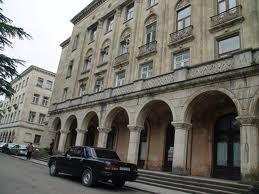Shorena Kakabadze, Kutaisi
Competition for the employees of Kutaisi local self-governmental bodies has become more active. Third round of interviews is underway after two noisy rounds of test-exams. Representatives of the Kutaisi City Hall stated the commission is working impartially though part of applicants does not agree with them. Nongovernmental organizations requested engagement in the process for more transparency.
Initially, non-governmental organizations were refused but later as a result of compromise were allowed to observe interviews with applicants. Namely, Georgian Young Lawyers’ Association together with three more non-governmental organizations shall work out a timetable according to which representative of one NGO will attend the interview. Chairperson of the Kutaisi office of GYLA Giorgi Chiqaberidze talked about the details with Humanrights.ge.
- Kutaisi office of the Georgian Young Lawyers’ Association, Kutaisi Regional Office of the Transparency International- Georgia, Imereti region branch of the Georgian Young Economists’ Association and the International Society for Fair Elections and Democracy appealed to the competition commission at Kutaisi local self-governance and requested to allow our representatives to attended third stage of the competition – interview as observers.
- Initially the Commission refused to allow non-governmental organizations to observe the interviews. Later, you were offired membership of the Commission. After your refusal they changed position again and today the commission is ready to accept your proposal. What was reason?
-Membership of the Commission was not acceptable to us, because in this case, we would not have possibility to observe the process. However, our goal is to observe the work of the Competition Commission. After our refusal, the commission offered the interested NGOs to select commission member as a result of consensus, who will participate in the full work of the commission including asking questions to an applicant (to check his/her qualification). Their answers to those questions will be considered during decision making process. The representative of NGOs will be allowed not to take part in the decision making process and maintain neutral position about all applicants. In addition, if above mentioned proposal is rejected, the Commission is ready to allow non-governmental organizations to determine total number and schedule of observers through consensus, that will not be not limited by the Commission. However, right to observe interviews will be realized based on the schedule worked out by NGOs. So, one observer from us will attend the interviews in turn.
-What would happen if an applicant is against your observer’s presence during the interview?
-The Commission will allow applicant to request interview without the presence of observer, and this request will be satisfied by the Commission in all cases.
-How do you assess the fact that Commission allowed NGOs to observe the process in turn and not together? Particularly when your group is not made of many NGOs?
- We have one goal to observe the process. We want this competition and test-exams to be fair and transparent. We want the Commission to work impartially, that rights of all applicants are protected. As for your question, reason of their refusal was possibility to stress the applicant if more than one representative of NGOs attends the interview. However, we think possibility of the stress was excluded because maximum 4 observers could be present in the interview; furthermore the contestant can refuse the observer to participate in his/her interview.
We think local government in Kutaisi would have ensured full participation of civil society organizations in the competition process if they had allowed all of us to have one representative during the interviews – four observers together."
News
December 13, 2023
Ethnic minorities outside the peace dialogue
November 6, 2023
‘Peace’ agenda of political parties
Popular
Articles
February 13, 2024




